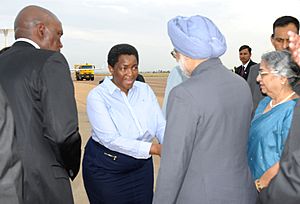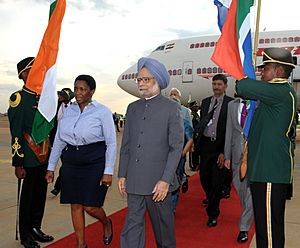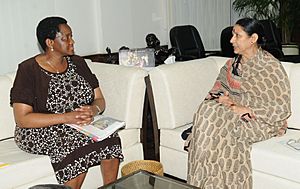Bathabile Dlamini facts for kids
Quick facts for kids
Bathabile Dlamini
|
|
|---|---|

Dlamini (second from left) meets Manmohan Singh
|
|
| 6th President of the African National Congress Women's League | |
| In office 7 August 2015 – April 2022 |
|
| Deputy | Sisi Ntombela |
| Preceded by | Angie Motshekga |
| Succeeded by | Sisisi Tolashe |
| Minister in the Presidency for Women | |
| In office 27 February 2018 – 29 May 2019 |
|
| President | Cyril Ramaphosa |
| Preceded by | Susan Shabangu |
| Succeeded by | Maite Nkoana-Mashabane |
| Minister of Social Development | |
| In office 1 November 2010 – 27 February 2018 |
|
| President | Jacob Zuma Cyril Ramaphosa |
| Preceded by | Edna Molewa |
| Succeeded by | Susan Shabangu |
| Personal details | |
| Born |
Bathabile Olive Dlamini
10 September 1962 Nquthu, Natal South Africa |
| Citizenship | South Africa |
| Political party | African National Congress |
| Alma mater | University of Zululand |
Bathabile Dlamini (born 10 September 1962) is a South African politician. She was the President of the African National Congress (ANC) Women's League from 2015 to 2022. She also served as a government minister, including as the Minister of Social Development.
Dlamini trained as a social worker. She became a well-known political figure in the ANC Women's League. She was also a Member of Parliament from 1994 to 2004. In 2006, she was found to have misused money meant for parliamentary travel.
She was a strong supporter of former President Jacob Zuma, who made her a minister in his government. After Zuma, she served for a short time as Minister for Women under President Cyril Ramaphosa. She was removed from the government after the 2019 election and left Parliament.
As Minister of Social Development, Dlamini was at the center of a major problem in 2017. This problem nearly stopped payments to millions of South Africans who rely on government support. A court and an official investigation found that she was partly responsible for this crisis. Later, she was also found to have not told the truth during the investigation.
Contents
Early Life and Career
Bathabile Olive Dlamini was born on 10 September 1962 in Nquthu, which is now part of KwaZulu-Natal, South Africa. She grew up in Matshensikazi and in Imbali, a township near Pietermaritzburg.
In the 1980s, she became involved in student and youth groups that were against apartheid, South Africa's old system of racial segregation. In 1989, she earned a degree in social work from the University of Zululand. For a few years, she worked as a social worker for an organization that helped people with physical disabilities.
From 1991, Dlamini helped rebuild the ANC Women's League (ANCWL) after the ANC was unbanned. She held leadership roles in the league, eventually becoming the Deputy Secretary General of the national ANCWL in 1993.
A Career in Parliament
In 1994, South Africa held its first democratic election. Dlamini was elected to the National Assembly, which is part of the South African Parliament. She served on committees that focused on prisons and social development. At the same time, she was the Secretary General of the ANCWL from 1998 to 2008.
Travel Money Issue
In 2005, Dlamini was involved in a situation known as "Travelgate." This was about the misuse of travel vouchers given to Members of Parliament. These vouchers were only for air travel. It was found that Dlamini used them for other things like hotels and car rentals. In 2006, she admitted to this and had to pay a large fine.
Roles in the ANC Party
Even after the travel money issue, Dlamini kept her role in the ANCWL. She became a strong supporter of Jacob Zuma within the ANC party. In 2007, she was elected to the ANC's National Executive Committee, which is the party's top leadership group.
In 2008, she ran for President of the ANCWL but lost to Angie Motshekga. However, she was still elected to the ANCWL's leadership committee. She also worked full-time for the ANC party in President Zuma's office.
Working as a Government Minister
Minister of Social Development (2009–2018)

After the 2009 election, President Jacob Zuma appointed Dlamini as the Deputy Minister of Social Development. A year later, in 2010, he promoted her to be the full Minister of Social Development.
She stayed in this role for many years. As minister, she was in charge of important government programs. These included programs to help young children and to address violence against women.
The Social Grants Crisis
In 2014, South Africa's highest court, the Constitutional Court, made a ruling. It said the contract with the company that paid out government grants was not done correctly. The court ordered the South African Social Security Agency (SASSA) to find a new way to pay the grants by April 2017.
SASSA, which Dlamini was in charge of, decided to handle the payments itself. However, as the 2017 deadline got closer, it was clear that SASSA was not ready. This caused a crisis because 17 million people depended on these grants for food and other basic needs. People worried they would not get their money.
The crisis was avoided when the Constitutional Court ordered that the old company could continue payments for another year. President Zuma defended Dlamini, but many others criticized her. They said she did not act soon enough to prevent the problem. The court itself said Dlamini was "ultimately responsible" for the crisis.
Official Inquiry
The Constitutional Court started an official inquiry, led by a retired judge, to look into Dlamini's role in the crisis. The judge's report in 2018 said that Dlamini had been "reckless" and "grossly negligent."
Based on this report, the court ruled that Dlamini was personally responsible for part of the crisis. She was ordered to pay some of the legal costs of the case herself. The inquiry also led to a later finding that she had not told the truth in court.
President of the ANC Women's League (2015–2022)

In August 2015, Dlamini was elected President of the ANCWL. She defeated Angie Motshekga, who was running for a second term. As league president, Dlamini and the ANCWL were known for strongly supporting President Zuma.
Her five-year term was supposed to end in 2020. However, in April 2022, the main ANC party decided to disband the ANCWL's leadership. This was because their term had expired. This ended Dlamini's time as president.
In 2023, Dlamini tried to become president of the Women's League again. However, she received very few nominations from the party branches and lost the election.
Minister for Women (2018–2019)
In February 2018, Jacob Zuma resigned as president. The new president, Cyril Ramaphosa, moved Dlamini to a new job as Minister for Women.
She held this position for just over a year. After the 2019 general election, President Ramaphosa did not include her in his new government. She was re-elected to Parliament but resigned from her seat a month later.
Court Finding of Untruthfulness
The 2018 inquiry into the social grants crisis suggested Dlamini had not been honest. The judge reported that she gave evasive answers and said things that other evidence proved wrong.
The Constitutional Court agreed with the judge. It said Dlamini had given false or misleading information while under oath. The court sent the report to the country's prosecutors to investigate.
In March 2022, a court found that Dlamini had "knowingly and intentionally" given false information. She was given a choice between four years in prison (with two years suspended) or paying a fine of R200,000. She chose to pay the fine.
Because of this finding, the ANC's Electoral Committee told Dlamini she could not run for a leadership position at the party's 2022 national conference.
Personal Life
Dlamini is a single mother.
 | May Edward Chinn |
 | Rebecca Cole |
 | Alexa Canady |
 | Dorothy Lavinia Brown |

